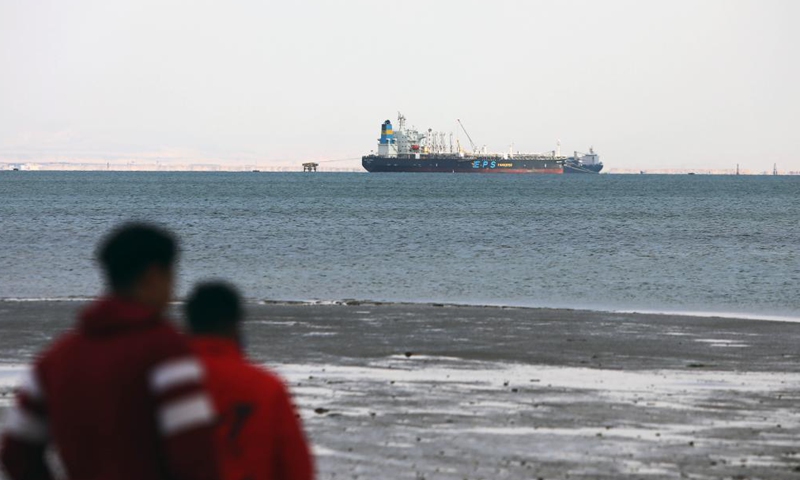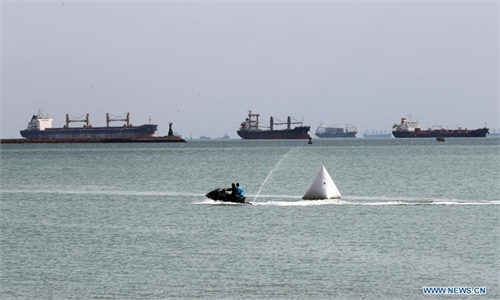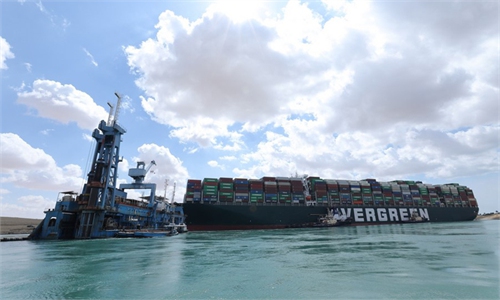As Suez Canal jam persists, Chinese firms seek ways out of predicament
Ships halt loading or re-route, while some clients turn to railways

Ships wait to pass the Suez Canal in the Gulf of Suez, Egypt, on March 26, 2021. Egypt's Suez Canal Authority (SCA) said on Thursday that it has temporarily suspended navigation through the world's busiest shipping course until the grounded cargo ship is completely freed.Photo:Xinhua
As a tariff jam in the Suez Canal caused by a massive containership continues, many Chinese firms are scrambling for ways out of the predicament, with some re-routing their ships and others opting for the China-Europe train services, maritime industry practitioners and experts told the Global Times.
A 200,000-ton ship operated by Evergreen Marine based in the island of Taiwan ran aground last week in the southern part of the Suez Canal, blocking one of the busiest trade routes in the world and creating an ocean-borne traffic jam. Efforts to free the vessel have failed so far, media reports said.
The block has affected many mainland-based ships that travel to and from Europe and North Africa.
Before stuck in the Suez Canal, the cargo ship, Ever Given, departed from Yantian International Container Terminals (Hutchison Ports Yantian) in South China's Guangdong Province.
Responding to the Global Times' inquiry on Monday, the port said that the ocean-borne traffic jam "has disrupted the logistic chain between Asia and Europe, which will make the terminal operation for returning ships more complex."
"For instance, containers may stay at the port for a longer period of time and workload for container shifts may also increase," warned by the port, which sets off three super-large ships on average daily from the Chinese mainland en route to Europe and the US.
The port told the Global Times that it has prepared coping strategies and will adjust operations depending on the situation of the blockage.
A staff member from an internet marine service provider told the Global Times on Sunday that the company is facing delays due to the Suez Canal jam. There is no word on how long the delays will last, and ships might have to bypass the southern tip of Africa in the meantime but so far rates haven't gone up, said the staff member, who requested anonymity.
Zhang Yongfeng, director of the shipping market analysis department of the Shanghai International Shipping Institute, said ships that have already entered the Suez Canal navigating zone, which is a long, narrow waterway, are unlikely to turn back and choose other routes, but others will probably re-route their ships around the Cape of Good Hope, which will delay deliveries by at least 10 days.
Zhang said that the incident will lead to problems such as rising oil prices and shortages of certain materials, but it should be just temporary and of limited impact on mainland businesses.
However, freight forwarding agents in China said that the whole industry is now being affected and costs are rising and merchants are also shifting from optimism to caution.
A grain trader based in East China's Fujian Province, who last week believed the problem could be solved soon, told the Global Times on Sunday that the incident will probably cause empty grain vessels to suspend the loading process.
"Going around the Cape of Good Hope requires a larger type of vessel, so this uncertainty will cause loading halts at ports," the trader said on condition of anonymity.
China imports huge volumes of grain from Ukraine, and that traffic normally goes through the Suez Canal.
"The route determines what type of vessels to hire, and there is also a shortage of vessels," the grain trader said.
A representative from a Tianjin-based logistics provider said that re-routing around the Cape of Good Hope could raise costs. "Some mainland ships have chosen to re-route, while some are choosing to wait. Our customers mostly have chosen to re-route," he said.
The canal blockage will prompt more companies to use trains, which will be a bonus for domestic railway lines like the Yiwu-Xinjiang-Europe cargo train, experts said.
A staff member of Haiyang Jiyun, a logistics agency, told the Global Times that "we are not sure when the canal can be cleared, so we recommend that our clients to choose cargo trains, which can ensure the date of delivery, if they want to ship goods to Europe."


